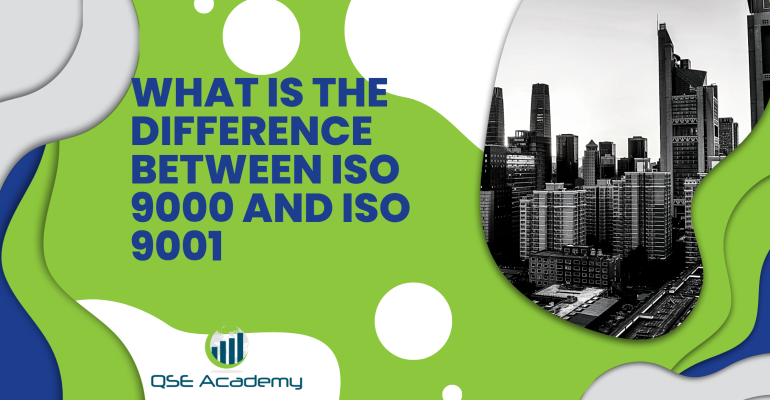What is the difference between ISO 9000 and ISO 9001?
Last Updated on October 13, 2025 by Hafsa J.
What is the difference between ISO 9000 and ISO 9001?
If you’ve ever looked into quality management standards, you’ve probably come across ISO 9000 and ISO 9001. They sound similar, right? That’s why many people wonder about the difference between ISO 9000 and ISO 9001—are they the same thing, or do they serve different purposes?
In simple terms, ISO 9000 is a set of guidelines that explains the principles of quality management, while ISO 9001 is a specific standard that organizations follow to get certified. Think of ISO 9000 as the “big picture” of quality management and ISO 9001 as the step-by-step instruction manual for actually implementing it.
Understanding the difference between ISO 9000 and ISO 9001 is important for businesses that want to improve efficiency, enhance customer satisfaction, and even achieve ISO certification. In this guide, we’ll break it all down in an easy-to-understand way so you can see how these two standards work together—but serve different roles.
Understanding ISO 9000 and ISO 9001
To really grasp the difference between ISO 9000 and ISO 9001, we need to look at what each one actually does. While they are closely related, they serve different purposes in the world of quality management systems. Let’s break it down!
What is ISO 9000?
Think of ISO 9000 as the foundation of the entire ISO 9000 family of standards. It doesn’t contain specific rules or requirements but instead explains the fundamental principles of quality management.
Here’s what ISO 9000 does:
- Defines key quality management principles – It explains best practices for managing processes efficiently and ensuring customer satisfaction.
- Provides a framework for understanding quality management – It helps businesses learn what a Quality Management System (QMS) should look like.
- Acts as a reference guide – Organizations use ISO 9000 to educate employees, improve processes, and build a quality-focused culture.
In short, ISO 9000 is not a certification standard—you can’t get “ISO 9000 certified.” Instead, it helps businesses understand the core ideas behind quality management so they can apply them effectively.
What is ISO 9001?
Now, here’s where things get more practical. ISO 9001 is the actual standard that businesses must follow if they want to achieve ISO certification.
Here’s what makes ISO 9001 different from ISO 9000:
ISO 9001 includes specific requirements – Unlike ISO 9000, it lays out clear, structured rules that businesses must follow to meet international quality standards.
It is a certifiable standard – Companies that follow ISO 9001 requirements can apply for ISO 9001 certification, proving they meet high-quality standards.
Focuses on implementation – While ISO 9000 explains concepts, ISO 9001 tells businesses exactly what they need to do to build an effective QMS.
If ISO 9000 is the theory, ISO 9001 is the action plan. If a company wants to improve efficiency, boost customer satisfaction, and get ISO certified, ISO 9001 is the standard they need to follow.
Now that we’ve covered what ISO 9000 and ISO 9001 are, let’s explore their key differences and how they work together!
The Key Difference Between ISO 9000 and ISO 9001
Now that we understand what ISO 9000 and ISO 9001 are, let’s get to the main question: What’s the difference between ISO 9000 and ISO 9001? While they are part of the same family of standards and work together, they serve different roles in quality management.
Think of it this way: ISO 9000 is like a quality management handbook, while ISO 9001 is the rulebook that companies follow to get certified.
ISO 9000 is a Guideline, ISO 9001 is a Certification Standard
One of the biggest differences between ISO 9000 and ISO 9001 is certification.
ISO 9000 is a general guideline – It provides principles and best practices for quality management but doesn’t contain specific requirements for certification.
ISO 9001 is a certifiable standard – It includes clear requirements that businesses must meet to get ISO 9001 certified.
This means that while ISO 9000 helps organizations understand quality management, only ISO 9001 provides a structured framework for actually implementing it in a way that can be audited and certified.
ISO 9000 Provides Concepts, ISO 9001 Requires Implementation
Another key difference between ISO 9000 and ISO 9001 is how they are used in practice.
ISO 9000 explains quality management principles – It teaches businesses how to create a culture of quality, but it doesn’t tell them exactly what steps to take.
ISO 9001 provides step-by-step requirements – It tells businesses exactly how to build a Quality Management System (QMS) that meets international standards.
Here’s an example:
A company that reads ISO 9000 will understand the importance of customer satisfaction, continuous improvement, and process management.
A company that implements ISO 9001 will create clear procedures, document processes, and set up systems for tracking quality performance—all necessary for certification.
In short, ISO 9000 is about understanding quality, while ISO 9001 is about applying it.
Businesses Use ISO 9001, While ISO 9000 Provides the Foundation
Most organizations that aim for certification focus on ISO 9001, but they use ISO 9000 as a reference to strengthen their understanding of quality management.
ISO 9000 helps businesses learn quality concepts and prepare for ISO 9001 implementation.
ISO 9001 provides the structure companies need to build an effective QMS and achieve certification.
So, while businesses don’t get certified for ISO 9000, they still benefit from using it as a learning tool. Meanwhile, ISO 9001 is the standard that organizations must follow if they want to prove their commitment to quality through certification.
Now that you understand the difference between ISO 9000 and ISO 9001, let’s explore why businesses need to know this distinction and how it affects their approach to quality management.
Why Do Businesses Need to Understand the Difference Between ISO 9000 and ISO 9001?
By now, you might be thinking, “Okay, I get that ISO 9000 is about concepts and ISO 9001 is about implementation, but why does this matter for businesses?”
Understanding the difference between ISO 9000 and ISO 9001 is crucial for any organization that wants to improve quality, streamline operations, and possibly get certified. Let’s look at some key reasons why businesses should be aware of these distinctions.
Avoiding Confusion in Certification Processes
One of the biggest mistakes businesses make is assuming they need to be ISO 9000 certified—but here’s the truth:
ISO 9000 certification does not exist.
ISO 9001 certification is what companies actually pursue.
Some companies spend time and resources studying ISO 9000, only to realize later that they need to follow ISO 9001 if they want a certification that proves their quality management system meets international standards.
By understanding the difference between ISO 9000 and ISO 9001, businesses can focus on the right standard from the start and avoid unnecessary confusion.
Implementing Quality Management More Effectively
Even if a business isn’t aiming for certification, knowing the difference between ISO 9000 and ISO 9001 helps them implement a more effective Quality Management System (QMS).
Using ISO 9000 as a learning tool – Businesses can educate employees on key quality principles before jumping into ISO 9001 implementation.
Applying ISO 9001 for real change – Companies that want to improve operations, reduce errors, and enhance customer satisfaction need to follow the structured approach of ISO 9001.
Instead of just talking about quality, ISO 9001 helps businesses put those ideas into action—and that’s where real improvements happen.
Ensuring Continuous Improvement in Business Processes
ISO 9001 is built on a continuous improvement mindset, meaning businesses are expected to constantly refine and enhance their processes. But how do they know what to improve? That’s where ISO 9000 plays a role.
ISO 9000 helps organizations understand the “why” behind quality management.
ISO 9001 provides the framework for making real improvements in day-to-day operations.
By combining ISO 9000’s principles with ISO 9001’s structured requirements, businesses can create a stronger, more sustainable quality management system.
Making Smarter Business Decisions
When businesses understand the difference between ISO 9000 and ISO 9001, they can make smarter, more strategic decisions about quality management.
Companies that want certification can focus directly on ISO 9001 requirements to get certified faster.
Organizations that want to build a strong quality culture can use ISO 9000 principles as a foundation before applying for ISO 9001.
Businesses looking to improve efficiency can use both ISO 9000 and ISO 9001 together to streamline operations and enhance performance.
At the end of the day, knowing how these two standards work together helps businesses maximize the benefits of a quality management system.
Now that we’ve covered why businesses need to understand the difference between ISO 9000 and ISO 9001, let’s go over some of the most frequently asked questions about these two standards.
Frequently Asked Questions About ISO 9000 and ISO 9001
Even with a clear understanding of the difference between ISO 9000 and ISO 9001, you might still have a few lingering questions. That’s totally normal! Let’s go over some of the most common questions businesses and professionals ask about these two quality management standards.
Is ISO 9000 Certification Required for ISO 9001?
No, ISO 9000 certification does not exist. Many businesses assume they need to be ISO 9000 certified before getting ISO 9001 certified, but that’s a misunderstanding.
ISO 9000 is just a guideline that explains quality management principles—it’s not something companies get certified for.
ISO 9001 is the standard that organizations follow to build a certifiable Quality Management System (QMS).
So, if your goal is to achieve ISO certification, you need to follow ISO 9001, not ISO 9000.
Can a Business Use ISO 9000 Without Implementing ISO 9001?
Yes! Some companies use ISO 9000 as a training and reference tool even if they don’t pursue ISO 9001 certification.
ISO 9000 helps organizations understand quality management principles and improve their internal processes.
It’s a great resource for companies that want to strengthen their quality culture but may not need full ISO 9001 certification.
However, if a company wants to prove to customers, clients, or regulators that it meets international quality standards, then it will need to implement ISO 9001 and go through the certification process.
Which One Should My Business Focus On?
That depends on your goals!
If you just want to understand quality management concepts and improve your business without formal certification, ISO 9000 is a great place to start.
If you want to get certified and prove that your company meets international quality standards, you need to implement ISO 9001.
If you’re serious about long-term success, it’s best to use both—ISO 9000 as a learning tool and ISO 9001 as a practical framework for quality management.
Does ISO 9001 Replace ISO 9000?
No, ISO 9001 does not replace ISO 9000—they serve different but complementary roles.
ISO 9000 provides the foundational principles of quality management.
ISO 9001 provides the actionable requirements needed to build and maintain a strong QMS.
Instead of thinking of them as competitors, think of them as two parts of the same puzzle—each plays an important role in helping businesses achieve high-quality standards.
Is ISO 9001 Harder to Implement Than ISO 9000?
Yes, but for a good reason!
ISO 9000 is easier to understand because it focuses on general principles rather than strict requirements.
ISO 9001 takes more effort because it requires businesses to document processes, train employees, and undergo audits to ensure compliance.
While ISO 9001 implementation takes time and effort, the benefits—better efficiency, improved customer satisfaction, and global credibility—make it well worth it.
Now that we’ve answered some of the most common questions about ISO 9000 and ISO 9001, let’s wrap up with a final recap on why understanding these two standards is so important.
Conclusion: Understanding the Difference Between ISO 9000 and ISO 9001
Now that we’ve explored the difference between ISO 9000 and ISO 9001, it’s clear that while they are closely related, they serve different purposes in quality management.
To recap:
- ISO 9000 is a guideline—it explains the principles of quality management and serves as a foundation for understanding how quality systems should work.
- ISO 9001 is a certifiable standard—it outlines specific requirements that businesses must meet to achieve ISO 9001 certification and demonstrate their commitment to quality.
So, what does this mean for businesses?
If you want to improve your knowledge of quality management and build a strong internal culture of continuous improvement, ISO 9000 is a great place to start.
If your company wants to become ISO certified, gain credibility, and show compliance with international standards, then ISO 9001 is the standard to follow.
If you’re serious about long-term success, using both ISO 9000 as a reference and ISO 9001 for implementation will help create a strong, structured Quality Management System (QMS).
Understanding the difference between ISO 9000 and ISO 9001 ensures that businesses make informed decisions, avoid certification confusion, and build a more effective approach to quality management.
If your next step is ISO 9001 certification, now is the time to start! Explore training options, assess your current processes, and take action toward building a stronger, more competitive business.
Ready to move from ISO 9001 theory to implementation?
Get the exact tools you need to write your documentation, train your team, map your processes, and pass your audit—without wasted time or guesswork.

make ISO standards less intimidating and more approachable for everyone.
Whether it’s ISO 9001, ISO 22000, or the cosmetics-focused ISO 22716, I’ve spent my career
turning complex jargon into clear, actionable steps that businesses can actually use.
I’m not here to call myself an expert—I prefer “enthusiast” because I truly love what I do.
There’s something incredibly rewarding about helping people navigate food safety and quality management systems
in a way that feels simple, practical, and even enjoyable.
When I’m not writing about standards, you’ll probably find me playing Piano 🎹, connecting with people, or diving into my next big project💫.
I’m an engineer specialized in the food and agricultural industry
I have a Master’s in QHSE management and over 12 years of experience as a Quality Manager
I’ve helped more than 15 companies implement ISO 9001, ISO 22000, ISO 22716, GMP, and other standards
My clients include food producers, cosmetics manufacturers, laboratories, and service companies
I believe quality systems should be simple, useful, and efficient.












